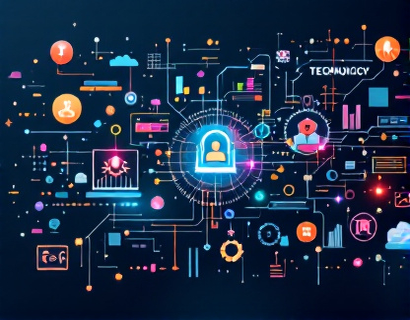Revolutionizing App Ecosystems: The Synergy of Crypto and AI
The integration of cryptocurrency and artificial intelligence is ushering in a new era of digital innovation, fundamentally transforming app ecosystems and user experiences. This fusion leverages the decentralized and secure nature of blockchain technology with the advanced computational capabilities of AI, creating seamless, efficient, and secure solutions that redefine how we interact online. As tech enthusiasts and early adopters, understanding this convergence is crucial for grasping the future of digital services.
The foundation of this revolution lies in the unique properties of blockchain technology. Blockchain provides a decentralized ledger that ensures transparency, security, and immutability. These attributes are invaluable in an era where data privacy and security are paramount. By eliminating the need for intermediaries, blockchain reduces transaction costs and speeds up processes, making it an ideal platform for various applications.
Enhanced Security through Blockchain
One of the most significant benefits of integrating blockchain into app ecosystems is enhanced security. Traditional centralized systems are vulnerable to hacking and data breaches, as they rely on a single point of failure. Blockchain, with its distributed nature, distributes data across a network of nodes, making it extremely difficult for malicious actors to alter or steal information. This decentralization ensures that user data remains secure and tamper-proof.
Moreover, blockchain's cryptographic algorithms provide robust authentication mechanisms. Each transaction is verified through complex mathematical problems, ensuring that only legitimate transactions are recorded on the blockchain. This not only protects user data but also builds trust within the app ecosystem, encouraging more users to adopt and engage with these services.
AI-Driven Personalization
Artificial intelligence plays a pivotal role in enhancing user experiences by enabling personalized interactions. AI algorithms can analyze vast amounts of user data to understand preferences, behaviors, and patterns. This insights-driven approach allows apps to tailor content, recommendations, and services to individual users, creating a more engaging and relevant experience.
For instance, in the realm of content delivery, AI can curate news feeds, entertainment recommendations, and shopping suggestions based on user history and real-time interactions. This level of personalization not only improves user satisfaction but also increases engagement and retention rates. By leveraging AI, apps can offer a more intuitive and user-friendly interface, setting them apart in a competitive market.
Smart Contracts: Automating Trust
Smart contracts, self-executing contracts with the terms directly written into code, are another transformative element in the crypto-AI synergy. These contracts automatically enforce and execute agreements when predefined conditions are met, eliminating the need for intermediaries and reducing transaction costs. In app ecosystems, smart contracts can facilitate seamless transactions, manage access controls, and automate workflows.
For example, in decentralized finance (DeFi) applications, smart contracts can automate lending, borrowing, and trading processes with high precision and speed. This automation not only streamlines operations but also reduces the risk of human error and fraud. The transparency of blockchain ensures that all transactions are visible and verifiable, further enhancing trust and reliability.
Predictive Analytics and Decision Making
AI's ability to perform predictive analytics is a game-changer for app ecosystems. By analyzing historical data and identifying trends, AI can forecast user behavior, market movements, and system performance. This foresight enables developers to proactively optimize app functionalities, allocate resources efficiently, and anticipate user needs.
In the context of app maintenance and development, predictive analytics can identify potential issues before they become critical, allowing for timely interventions. This proactive approach not only enhances the stability and performance of apps but also improves the overall user experience. Users benefit from fewer disruptions and a more reliable service, fostering greater loyalty and satisfaction.
Decentralized Identity Management
Identity verification and management are critical components of any app ecosystem. Traditional methods often involve centralized databases that are susceptible to breaches and misuse. Blockchain-based identity solutions offer a decentralized alternative, giving users control over their personal data while ensuring secure and verifiable authentication.
Through the use of self-sovereign identity (SSI), users can create and manage their digital identities without relying on third parties. AI can enhance this process by verifying identities through biometric data and behavioral patterns, adding an extra layer of security. This combination ensures that user data is protected and that only authorized individuals can access sensitive information.
Interoperability and Ecosystem Integration
The true potential of crypto and AI in app ecosystems is realized through interoperability and integration. Blockchain's open standards and protocols enable different systems and platforms to communicate and transact seamlessly. AI can facilitate this interoperability by intelligently managing data exchange, ensuring compatibility, and optimizing performance across diverse applications.
For instance, cross-chain solutions allow assets and data to move between different blockchain networks, expanding the scope of possible interactions and use cases. AI can orchestrate these interactions, ensuring smooth and efficient data transfer and processing. This level of integration not only enhances the functionality of individual apps but also creates a more cohesive and interconnected digital landscape.
Challenges and Considerations
Despite the numerous advantages, the integration of crypto and AI in app ecosystems is not without challenges. Regulatory uncertainties and the evolving legal landscape pose significant hurdles. Ensuring compliance with data protection laws and financial regulations is crucial for the sustainable growth of these technologies.
Technical complexity is another consideration. Developing and maintaining blockchain and AI systems requires specialized expertise, which can be a barrier for smaller developers and startups. However, as the ecosystem matures, more tools and resources will become available, making it more accessible to a broader range of developers.
Future Prospects
The future of app ecosystems lies in the continued convergence of cryptocurrency and artificial intelligence. As these technologies advance, we can expect even more innovative solutions that enhance user experiences and drive digital transformation. The potential for decentralized applications, enhanced security, personalized interactions, and efficient operations is immense.
Moreover, the rise of Web 3.0, a decentralized internet powered by blockchain, aligns perfectly with the capabilities of AI. Together, they will pave the way for a more open, secure, and intelligent digital world. Early adopters and tech enthusiasts have the opportunity to be at the forefront of this revolution, shaping the future of online interactions and services.
In conclusion, the fusion of crypto and AI is not just a technological trend but a fundamental shift in how we build and interact within app ecosystems. By embracing these innovations, we can create more secure, personalized, and efficient digital experiences that cater to the evolving needs of users in the modern world.











































